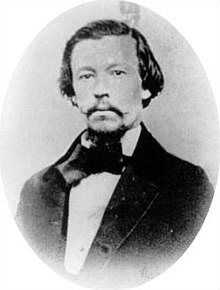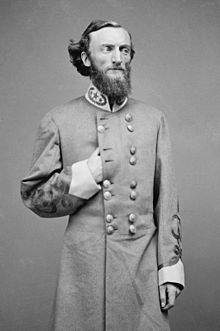Lucius M. Walker
Lucius Walker Marshall (* 18th October 1829 in Columbia , Tennessee , † 7. September 1863 in Little Rock , Arkansas ) was an American officer in the Civil War on the side of the Confederacy fought. Most recently with the rank of Brigadier General , he was fatally wounded in September 1863 in a duel with Brigadier John S. Marmaduke . The reason for the duel was the allegation of cowardice by Marmaduke after the battle of Bayou Meto on August 27th of that year.
Career
Walker was born the third child and eldest son of Jane Maria Polk (1798–1876) and James Walker (1792–1864); his mother was a sister of US President James K. Polk and Walker was his nephew. In 1850 he graduated from the United States Military Academy as the 15th of his class consisting of 44 cadets. At first he held the brevet rank of 2nd lieutenant , but was also promoted to this rank in 1852. A short time later, he resigned from the military to do business in Tennessee. On November 27, 1856, in Columbia, Walker married Celestine Garth, originally from Virginia , known as "Cellie". The couple had three daughters and a son who was born shortly before Walker's death.
When the Civil War broke out, Walker joined the 40th Tennessee Infantry Regiment as a Colonel on November 11, 1861 , which was initially near Memphis , Tennessee. In 1862 the regiment was relocated to New Madrid , Missouri , to help attack No. 10 to participate. On March 11, 1862, Walker was appointed commander of the 40th Tennessee Infantry Regiment by Lt. Col. CC Henderson replaced and promoted to brigadier general. At Kentucky Bend he was soon taken prisoner of war, but returned a short time later as part of a prisoner exchange to the Confederate Army.
On May 9, 1862, Walker commanded a successful attack by his brigade in the Battle of Farmington , a battle during the first Battle of Corinth . On March 23, 1863, Walker was transferred to the Trans-Mississippi Theater, where he was under the command of Lt. Gene. Theophilus H. Holmes led a cavalry brigade at the Battle of Helena .
The duel
On August 26, 1863, it came in Pulaski County in central Arkansas to a skirmish between Union troops under the leadership of John Davidson and a unit belonging to the Army of Arkansas under the command of John S. Marmaduke . After the Union's first attacks, the Confederates withdrew across the Bayou Meto stream , destroying the Reed's Bridge crossing in the process . Then the attack could be stopped by the use of artillery across the river, whereupon Davidson broke off the attack and withdrew his troops.
Tension erupted repeatedly between Marmaduke and Walker during the battle. Walker several times failed to comply with Marmaduke's request to consult with him in the first line about how to proceed and, under the impression of the first attacks, which made him fearful of being exposed to a flank attack, had withdrawn his cavalry unit. Marmaduke then accused Walker of cowardice and asked his superior Major General Sterling Price under threat of resignation to transfer Walker or himself. Price complied and ordered Walker's transfer. Walker then requested an explanation in writing for this procedure.
However, the messengers who were supposed to deliver the letter to Price withheld it, and Walker's confidante, Col. Robert H. Crockett (a grandson of Davy Crockett ) arbitrarily challenged Marmaduke to a duel on behalf of Walker. Walker and Marmaduke consented, while Price tried unsuccessfully to intervene, and the duel finally took place on September 6, 1863 at the Godfrey LeFevre plantation outside Little Rock. Crockett was Walker's adjutant , and Marmaduke was Cpt. John C. Moore accompanied. With the first shot both missed their respective opponents, with the second shot, however, Walker was hit and died the evening of the following day in Little Rock.
Walker was buried in Elmwood Cemetery in Memphis. Marmaduke was briefly arrested after Price's duel, but released a little later due to the requirements of the campaign.
Web links
- The Encyclopedia of Arkansas History & Culture:
- Lucius Marshall Walker (Eng.)
- Action at Bayou Meto (Engl.)
- Marmaduke-Walker Duel (Eng.)
- findagrave.com: Lucius Marshall Walker (Engl.)
- civilwarreference.com: Lucius Marshall Walker, Confederate General (Eng.)
| personal data | |
|---|---|
| SURNAME | Walker, Lucius M. |
| ALTERNATIVE NAMES | Walker, Lucius Marshall (full name) |
| BRIEF DESCRIPTION | American Confederate General in the Civil War |
| DATE OF BIRTH | October 18, 1829 |
| PLACE OF BIRTH | Columbia (Tennessee) |
| DATE OF DEATH | September 7, 1863 |
| Place of death | Little Rock , Arkansas |

